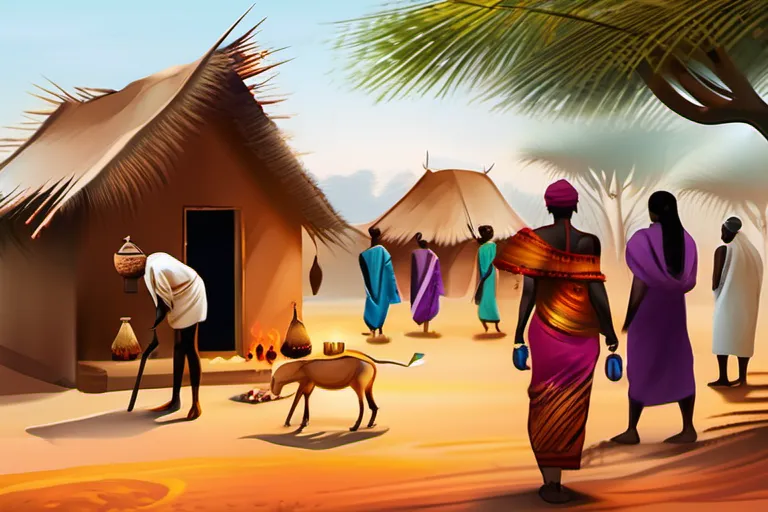Exploring the role, practices, and impact of African traditional religion on modern life
African traditional religion is a rich tapestry of beliefs, rituals, and spiritual practices that have been passed down through generations. In this article, we delve into the importance of these ancient faiths in today’s globalized world.
The Origins and Evolution of African Traditional Religion
The origins and evolution of African traditional religion are like the ancient rivers that carve deep into the earth, revealing layers of history. These religions have been passed down through generations, forming a cultural backbone for many communities in Africa. How did these ancient beliefs survive the test of time? What role do they play today in shaping modern societies?
Imagine a seed planted long ago in the fertile soil of African land, growing into a vast tree with branches reaching out to every corner of the continent. Each leaf on this tree represents a different tribe, each with its unique customs and practices that have evolved over centuries. These traditions are not just relics from the past but living, breathing entities that continue to influence contemporary life.
These religions are like vibrant tapestries, woven with threads of mythology, folklore, and spiritual rituals. They have adapted to modern challenges while still maintaining their core values and beliefs. In a world dominated by technological advancements and rapid globalization, the resilience of African traditional religion is a testament to its deep-rooted significance.
Moreover, these religions offer a rich source of wisdom, guiding individuals through life’s complexities. They provide a framework for understanding the interconnectedness of all things, a concept that resonates deeply in today’s globalized and often fragmented world. How do we find our place in this vast, ever-evolving universe? African traditional religion offers profound insights into these questions.
As we explore further, it becomes clear that the significance of African traditional religion lies not just in its past but in its present and future. These ancient beliefs continue to shape cultural identity, social structures, and even economic practices across the continent. How can we harness their power to address contemporary issues such as environmental conservation, community resilience, and spiritual well-being?
Key Beliefs and Practices in African Traditional Religion
Key Beliefs and Practices in African Traditional Religion: Delve into the core beliefs, rituals, and spiritual practices that define African traditional religion.
Imagine a vast tapestry, woven with threads of belief and tradition, where each thread represents a unique practice or belief within African traditional religion. This religion, deeply rooted in the soil and spirit of Africa, continues to shape modern society. How do these beliefs intertwine with daily life? Why are rituals such as divination and ancestor worship still so significant?
One of the fundamental beliefs is the presence of a supreme being or creator, often seen as omnipotent but also distant from human affairs. However, it’s the ancestors who act as intermediaries between humans and the divine, offering guidance and protection. This belief is not just a myth; it’s a lived reality for many Africans today.
Rituals play a crucial role in maintaining social harmony and ensuring community well-being. For instance, initiation ceremonies, which mark significant life transitions like puberty or marriage, are still celebrated with great fervor. These rituals not only strengthen bonds within the community but also instill moral values and cultural heritage.
The practice of divination is another intriguing aspect, often seen as a way to seek guidance from spirits or ancestors. Diviners use various methods, including herbalism, dreams, and even the natural environment, to provide insights that help individuals make important life decisions. In a world where modernity can sometimes feel overwhelming, these practices offer a sense of continuity and connection.
African traditional religion also includes rich spiritual landscapes, from veneration of natural elements like rivers and mountains to complex pantheons of gods and goddesses. These beliefs often find expression through vibrant festivals and celebrations that are integral to the cultural fabric of many African societies.
The Role of African Traditional Religion in Modern Life
How does African traditional religion continue to shape modern life? In many communities, it serves as a cornerstone for social cohesion and cultural identity. Can you imagine a society where ancient spiritual practices hold as much relevance today as they did centuries ago? The answer lies in the enduring impact of these traditions on community building.
African traditional religion often revolves around community rituals that bring people together. These communal events can range from festivals celebrating harvests to initiations marking important life transitions. By participating in such ceremonies, individuals reinforce their connections with family, friends, and the broader community. It’s like a thread woven through the fabric of society, keeping everyone interconnected.
The role of ancestors is another significant aspect that transcends time. Ancestors are revered not just as figures from the past but as guides and protectors in the present. By paying homage to them, individuals seek their blessings and guidance. This spiritual connection helps to maintain a sense of continuity and heritage, bridging generations.
Moreover, cultural preservation is intrinsically linked with these religious practices. Stories, songs, dances—every element carries the weight of history and tradition. By preserving these elements, communities ensure that their cultural identity remains strong amidst changing times. It’s as if each ritual is a safeguard against forgetting where they came from.
African traditional religion also plays a crucial role in healing. Many communities turn to traditional healers for both physical and spiritual ailments. These healers often act as intermediaries between the physical world and the spirit realm, offering not just medicine but holistic care that addresses emotional and mental well-being too.
In conclusion, African traditional religion is far from being a relic of the past. It continues to thrive in today’s society, weaving through every aspect of life, from community building to personal healing. Its relevance lies in its ability to adapt while maintaining timeless traditions, making it an integral part of modern life. How can we overlook such a profound influence in our rapidly changing world?
African Traditional Religion and Cultural Sensitivity
Understanding and respecting African traditional religion as a means of promoting cultural sensitivity and dialogue is crucial for today’s interconnected world. How can we truly appreciate the diverse tapestry of human cultures if we fail to recognize the profound impact that African traditional religions have on modern life? Just like a river flows through different terrains, these ancient beliefs and practices weave through the fabric of African societies, influencing everything from daily rituals to communal gatherings.
Imagine stepping into an African village where traditional drumming marks the beginning and end of each day. These drums are not just instruments; they are messengers of sacred knowledge, carrying messages between the earthly realm and the spiritual world. By embracing these practices, we open ourselves to a deeper understanding of the interconnectedness of all life—a concept that resonates far beyond African borders.
Moreover, respecting African traditional religions fosters an environment where cultural sensitivity thrives. It encourages dialogue rather than division, allowing us to see each other not as strangers but as fellow travelers on this journey called life. How can we build a truly global community if we approach others with suspicion and ignorance? By learning about the rich spiritual traditions of Africa, we pave the way for mutual respect and understanding.
Consider the ancestral reverence that is deeply rooted in many African communities. Ancestors are not just remembered on special occasions but are considered integral to the ongoing fabric of society. This practice can teach us valuable lessons about honoring our heritage and the importance of maintaining a connection with our past. It challenges us to ask: What legacy do we want to leave for future generations?
In conclusion, understanding African traditional religion is not just about learning about ancient practices; it’s about embracing a pathway towards cultural sensitivity and fostering global dialogue. By walking this path, we enrich our own lives while contributing to a more harmonious world where respect and appreciation for diversity reign supreme.
The Global Impact of African Traditional Religion
African traditional religion, often seen as a relic of the past, continues to exert a profound influence on contemporary societies across the globe. How can something deeply rooted in ancient rituals and beliefs still resonate so powerfully in our modern world? Is it not like a hidden river, flowing beneath the surface of today’s fast-paced society, shaping behaviors and attitudes without much acknowledgment?
The global impact of African traditional religion is multifaceted. It serves as a cultural lifeline for millions, providing a sense of identity and belonging in an increasingly interconnected world. Through its vibrant festivals, spiritual practices, and community gatherings, it fosters a strong connection to one’s heritage, much like a sturdy vine that binds the branches of a tree together.
In many regions, African traditional religion plays a pivotal role in addressing contemporary social issues such as poverty, inequality, and environmental degradation. It offers time-tested solutions, emphasizing community cooperation and harmony with nature. For instance, the belief in interconnectedness found in many traditional religions encourages sustainable living practices that modern society is now rediscovering.
The global spread of African traditional religion can be seen through the rise of spiritual movements like Revivalism, which draw on these ancient practices to offer solace and guidance to individuals seeking meaningful connections beyond materialistic pursuits. These movements highlight the resilience and adaptability of this faith, showing how it has evolved to meet the needs of contemporary humanity.
Moreover, African traditional religion contributes significantly to religious pluralism by promoting an inclusive approach to spirituality. It challenges the exclusivist narratives often found in mainstream religions, advocating instead for a harmonious coexistence where diverse beliefs can thrive together. This inclusivity is crucial in today’s multicultural and multifaith societies.
Understanding the global impact of African traditional religion not only enriches our cultural dialogue but also provides valuable insights into addressing some of the world’s most pressing challenges. It reminds us that there is much to learn from ancient wisdom, urging us to embrace a more holistic and interconnected worldview in our modern lives.
Embracing the Wisdom of African Traditional Religion
Imagine for a moment that you are walking through a dense forest, surrounded by towering trees and the whispers of nature. You find yourself in a place where ancient traditions and modern lives intertwine, like the roots and branches of these majestic trees. This is not just any forest; it’s the heartland of African traditional religion, a vast and intricate network of beliefs and practices that have shaped cultures for centuries.
How can we benefit from embracing this ancient wisdom? The answer lies in the very fabric of our modern society, where divisiveness often seems to overshadow unity. African traditional religion teaches us about inclusivity. In a world divided by race, religion, and nationality, these traditions remind us that every individual has a place within the larger tapestry of life. Just as different leaves on a tree share nutrients and support each other’s growth, so can diverse communities coexist in harmony.
Moreover, African traditional religion offers profound insights into promoting peace. By emphasizing respect for elders and ancestors, these beliefs encourage a deep sense of community and shared responsibility. In a society that often prioritizes individualism over collective well-being, this approach fosters an environment where conflict is resolved through dialogue and understanding rather than confrontation.
The benefits extend far beyond personal ethics; they enrich our lives in tangible ways. From healing practices that address both physical and spiritual ailments to community festivals that celebrate the cycles of nature, these traditions provide a rich cultural heritage that can be drawn upon for emotional support and spiritual guidance.
So why not take a step back into this ancient wisdom? Let us explore how these beliefs can guide us through today’s challenges. By doing so, we may find new pathways to inclusivity, peace, and personal fulfillment—much like the many paths that wind through the heart of the forest, leading us towards a more harmonious existence.
Conclusion
 Understanding African traditional religion can foster cultural sensitivity, promote dialogue, and contribute to a more inclusive society. By embracing its wisdom, we can enrich our lives and build bridges between communities.
Understanding African traditional religion can foster cultural sensitivity, promote dialogue, and contribute to a more inclusive society. By embracing its wisdom, we can enrich our lives and build bridges between communities.











